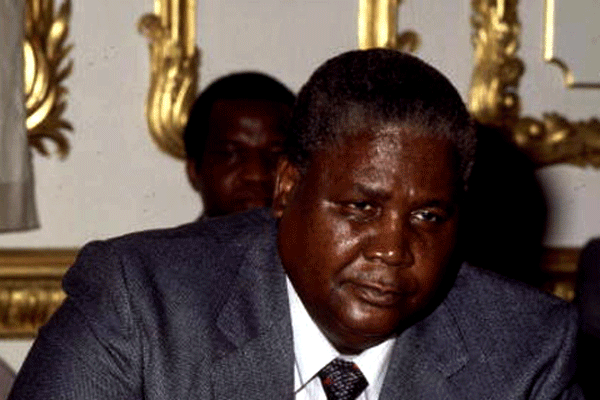
TODAY marks exactly 18 years since Joshua Nkomo, Zimbabwe’s late Vice-President, died of prostate cancer in Harare in 1999.
BY RICHARD CHIDZA

Nkomo would have been 100 years old on June 7 and is regarded as “the best President Zimbabwe never had”.
Revered at home and abroad, the establishment and even his comrades seem to have forgotten Nkomo.
Zapu had no statement or organised an event in honour of Nkomo as of yesterday morning.
The party’s deputy secretary-general, Mjobisa Noko seemed jolted into action when NewsDay Weekender called.
“Surely we will have something. Let me talk to the spokesperson and come back to you,” he said.
Zanu PF spokesperson, Simon Khaya Moyo, who was Nkomo’s special assistant while in exile, said the late national hero was a Pan-Africanist par excellence and a nationalist of the highest order.
- Chamisa under fire over US$120K donation
- Mavhunga puts DeMbare into Chibuku quarterfinals
- Pension funds bet on Cabora Bassa oilfields
- Councils defy govt fire tender directive
Keep Reading
“Nkomo was a humble, principled and persevering man who was also very courageous and loved Zimbabweans without regard to their race, tribe or region or origin. He was a champion of unity, peace and development and a selfless visionary,” he said.
Asked on Nkomo’s views of corruption ravaging the country, Khaya Moyo said: “Nkomo hated corruption and factionalism. There was no factionalism in the parties he lead before the Unity Accord”.
The country’s biggest opposition party by parliamentary representation, MDC-T, was eerily quiet as well, cementing its position as a neo-liberal political outfit with no roots in the country’s history and, in particular, the liberation struggle.
Nkomo’s legacy, and that of other forgotten luminaries like Herbert Chitepo, Josiah Tongogara, Alfred Nikita Mangena and Jason Ziyaphapha Moyo, would have earned any political party outside Zanu PF a few browny points with the people.
Telecommunications behemoth, Econet Wireless has one of a few positive legacies connected to Nkomo, a scholarship benefitting underprivileged children.
Nkomo fought hard to force Mugabe’s hand in awarding business magnate, Strive Masiyiwa, the Econet Wireless founder and chairman, a licence.
Masiyiwa has never forgotten Nkomo. Opposition National People’s Party leader and former Vice-President Joice Mujuru, who fought Nkomo in the Econet licence saga, also had no word on Nkomo.
Nkomo worked hard for an egalitarian society, which earned him the nickname Father Zimbabwe.
While some expected him to win the first elections in Zimbabwe in 1980, the Zapu leader lost to Zanu’s Robert Mugabe, who was to become Prime Minister and later executive President, a position he has retained for 37 years.
At the Lancaster House conference, during negotiations for majority rule, the fighting forces fronted by Zapu and Zanu had agreed to participate in the first elections under the banner of the Patriotic Front, but Mugabe, as a cunning fox, was to abandon the idea at the 11th hour.
Nkomo’s Zapu became the initial official opposition at independence and members of his inner circle joined Mugabe’s Cabinet and the ranks of the unified security establishment.
As the guns of the liberation struggle died down, Mugabe began a vicious campaign to establish a one-party State targeting Nkomo’s party.
Then Home Affairs minister, Nkomo was hounded out of government and the country in an orgy of violence that was to be christened Gukurahundi.
Carried out by a crack military unit trained by North Korea and codenamed 5th Brigade, the violent campaign was to claim more than 20 000 lives, forcing Nkomo into exile.
But before he left, the former Vice-President officiated at the burial of another struggle stalwart and military strategist, Zapu’s wartime commander, Lookout Masuku, who died chained to his hospital bed by Mugabe’s regime following his arrest on charges of treason.
“Why should men like Lookout and Dumiso (Dabengwa) (then Zapu’s intelligence supremo), after being found innocent of any wrongdoing by the highest court in this land, remain detained? When we ask, we get the same answer from the minister, as we used to get from the (Ian) Smith regime.
“Mafela, Lookout, after all his sacrifices, died a pauper in our own hands. We cannot blame colonialism and imperialism for this tragedy. We, who fought against these things, now practice them. Why? Why? Why?” Nkomo lamented.
Mugabe continues to blame imperialism for the tragedy that Zimbabwe has become. It is a living example of how not to govern a country.
The systematic killing of his supporters and those accused of supporting his party under the guise of hunting down dissidents forced Nkomo into capitulating and agreeing to a lopsided Unity Accord in 1987 that resulted in the “formation” of a united Zanu PF and his appointment as Vice-President along with the late Simon Muzenda.
Nkomo was a prophet in his own right.
“We are enveloped in the politics of hate. The amount of hate that is being preached today in this country is frightful. What Zimbabwe fought for was peace, progress, love, respect, justice, equality, not the opposite. And one of the worst evils we see today is corruption. The country bleeds today because of corruption,” he said in April 1986.











